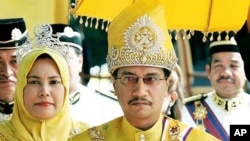Organizers of a major election reform movement in Malaysia have agreed to move their rally to a stadium instead of marching through the streets. The agreement, which came during a meeting with Malaysia’s king on Tuesday, could help defuse political tensions that have been mounting following the arrests of more than 200 political activists in recent weeks.
Malaysia's constitutional monarch, Tuanku Mizan Zainal Abidin, met with leaders of Bersih, an electoral reform coalition that includes members of political opposition parties, to try to prevent a confrontation between the group and police.
After the meeting, Bersih said it would be willing to move the location of their planned July 11 rally to call for voting reforms and equal access to news media for opposition candidates ahead of national elections expected next year. Earlier the prime minister said he had no objection to moving the rally to a stadium after the government refused to grant a demonstration permit to hold the event in the streets. Bersih organizers say they have not yet been in direct contact with government officials to confirm the change of venue.
The government had declared the planned rally illegal and has already arrested more than 200 hundred activists. Some have been detained under an emergency ordinance law that allows them to be held for 60 days without charge.
On Sunday the king issued a statement asking both sides to settle their differences through negotiations. The king's power in Malaysia's parliament system of government is mostly symbolic. Prior to the meeting Andrew Khoo, a member of Bersih's steering committee, says the king does have the power to persuade both sides to compromise.
“To a certain extent we would not want to disrespect what his majesty the king has stated in his statement," said Khoo. "So we will try to find a compromise perhaps that would on the one hand address his concerns, but at the same time still take into consideration the eight demands that we have put forward about the need to reform the electoral process in Malaysia.”
He said he hopes the government will demonstrate compromise by considering their reform proposals and releasing the arrested activists.
The government of Malaysia has been controlled by one political party, the United Malays National Organization (UMNO) since independence in 1957.
The last time Bersih, formally known as the Coalition for Clean and Fair Elections, held a demonstration in Kuala Lumpur in 2007, tens of thousands of people turned out. The authorities responded by using water cannons and tear gas to disperse the crowds. A few months later, the ruling coalition lost its two-thirds majority in Malaysia's parliament for the first time in decades.
James Chin, a professor of political science at Monash University in Kuala Lumpur says, if UMNO did not have control of the news media, the electoral commission and the government in 2008, its election losses would have been much worse.
“Many people, such as myself think, that although elections are held regularly, the elections are not run in the transparent or free manner," said Chin. "So for example in every election the government use the government machinery to support its campaign. And many people think that, if there is a free and fair election in Malaysia, the opposition would probably have taken power in 2008.”
New elections are required under Malaysian law by early 2013. Professor Chin says Malaysian Prime Minister Najib Razak would likely be forced to resign if UMNO does not regain its two-thirds majority in parliament in the next election.





